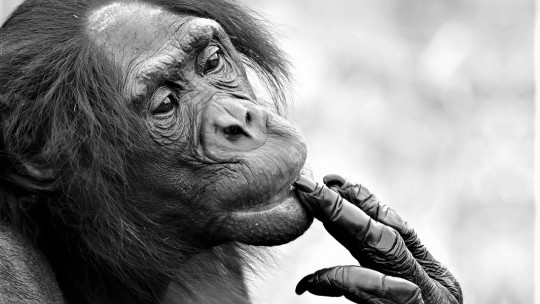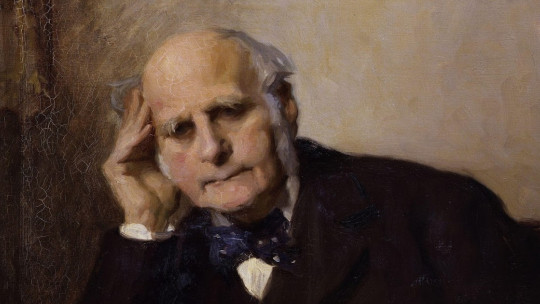
The evolution of the human brain compared to other animals, specifically primates, is still a mystery under constant investigation. Provoking numerous debates since the English naturalist Charles Darwin presented his theory of evolution to the world in 1859.
One of the most important assumptions that try to explain this difference is the Machiavellian theory of intelligence, which relates the evolution and development of the brain with the level of social development of each species.
What is the theory of Machiavellian intelligence?
Unlike other animals, humans have experienced infinitely greater brain development, with the cognitive and behavioral consequences that this entails. Even compared to primates, The human brain is considerably larger and more complex
Although it has not yet been possible to establish in a completely secure way what the cause of these abysmal differences in brain development is, there are many theories that try to explain this phenomenon that gave “homo sapiens” the ability to develop a much stronger mind. complex.
Some of them propose that brain development is a response to the ability to adapt to changes or alterations in the environment. According to these hypotheses, the subjects with the greatest capacity for adaptation and who were able to overcome and survive the adversities of the environment, such as environmental or meteorological conditions, have managed to spread their genes, leading to progressive brain development
However, there is another theory with much more support from the scientific community: the theory of Machiavellian intelligence. Also known as social brain theory, this assumption postulates that the most important factor in brain development is social competition.
Broadly speaking, this means that those individuals with more skills for life in society had a better chance of surviving. Specifically, these skills considered Machiavellian make references to social behaviors such as the ability to lie, mischief, and insight. That is to say, the most astute subjects with the most social skills They achieved much greater social and reproductive success.
How was this idea forged?
In the research work “Social Behavior and Evolution of Primates” published in 1953 by researchers MRA Chance and AP Mead, it was suggested for the first time that social interaction, understood as part of an environment of competitiveness to achieve status within a social structure the key to understanding brain development in hominid primates could be found.
Later, in 1982, the Dutch researcher specialized in psychology, primatology and ethology, Francis de Waal, introduced the concept of Machiavellian intelligence in his work. Chimpanzee politicsin which he describes the social and political behavior of chimpanzees.
However, it was not until 1988 that the theory of Machiavellian intelligence as such was developed. Thanks to the background that relates the concepts of the brain and social cognition and Machiavellian intelligence, psychologists Richard W. Byrne and Andrew Whiten, researchers at the University of St. Andrews in Scotland, carry out a research compendium published under the name “ Machiavellian intelligence: social experience and evolution of intellect in monkeys, apes and humans.
In this work, the researchers present the hypotheses of Machiavellian intelligence, which attempts to convey the idea that the mere need to be more insightful and astute than other individuals generates an evolutionary dynamic in which Machiavellian intelligence, in the form of use of social cognition skills, would lead to a social and reproductive advantage
Brain development and social intelligence
Although at first glance it may be complicated to associate the level of intelligence or brain development with a phenomenon of a social nature, the truth is that the hypothesis of Machiavellian intelligence is supported by neuroanatomical evidence
According to this theory, the cognitive demands and demands due to an increase in social interactions, which in turn comes from the gradual increase in the number of individuals in a society, caused a growth in the size of the neocortex, as well as its complexity..
From the perspective of the Machiavellian intelligence hypothesis, The increase in complexity and size of the neocortex is a function of the variability of behaviors that the subject can carry out in interaction with his society. This specification is of special relevance since it explains the differences in the development of the neocortex between primates and humans compared to other animal species.
Furthermore, numerous works and studies support the idea that the dimensions of the neocortex increase as the size of the social group increases Furthermore, in the specific case of primates, the size of the amygdala, an organ traditionally linked to emotional responses, also increases as the size of the social group increases.
This is because for social integration and success, the correct development of emotional modulation and regulation skills is necessary, hence the consequent increase in the size of the amygdala.
The Gavrilets and Vose study
With the aim of testing this hypothesis, researchers from the University of Tennessee, United States, S. Gavrilets and A. Vose, carried out a study in which, by designing a mathematical model, the development of the brain of females could be simulated. people based on the theory of Machiavellian intelligence.
To do this, the researchers took into consideration the genes responsible for learning social skills Reaching the conclusion that the cognitive abilities of our ancestors increased significantly over only 10,000 or 20,000 generations, a very short period of time taking into account the history of humanity.
This study describes brain and cognitive development in three different phases that occurred throughout human history:
It is necessary to specify that the authors themselves report that their results do not necessarily demonstrate the hypothesis of the theory of Machiavellian intelligence, but rather that the mechanisms or phenomena that produced this growth may coincide with the historical temporal moment in which they are hypothesized to have occurred.








